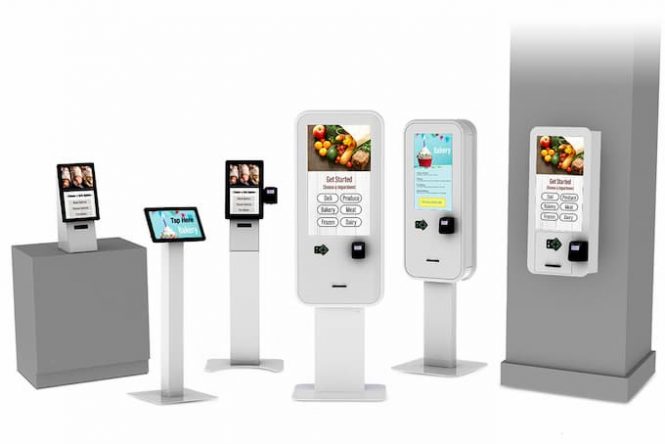
Table of Contents
ToggleCommon FAQ Self-Service Kiosk Questions
- February 5, 2020
- Dave Loyda
- Full article on site
Home » Self-Service Kiosks » Common Self-Service Kiosk Questions
Self-service kiosks continue to rise in popularity as a powerful tool benefiting businesses’ customer experience strategies. With this surge in interest comes more inquiries about everything from payment options to ADA compliance. Below, we’ve compiled a list of the most common self-service kiosk questions and their answers.
Why should my quick-service restaurant invest in self-service kiosks?
Self-service kiosks offer significant advantages to QSRs and fast casuals. Not only do kiosks shorten wait times at checkout counters, but data shows kiosks can increase average ticket orders up to 30 percent due to cross-selling capabilities and the privacy units offer customers during the ordering process. In addition, labor can be diverted to more customer-focused duties like expediting food or cleaning, which can directly impact your customer’s experience at your establishment. As more restaurants invest in the technology, patrons will expect their favorite QSRs and fast casuals to offer the same efficiency and convenience being offered elsewhere.
I’m not a restaurant. Does my business need self-service kiosks, too?
Yes! While self-service kiosks have been highly visible in the QSR industry, countless other verticals can utilize the benefits of this technology, too. From wayfinding to registration capabilities, self-service kiosks offer unlimited opportunities for other industries like automotive, grocery, home improvement, retail, hospitality, cannabis dispensaries, and more. In fact, having self-service technology can serve as a competitive advantage in a demanding retail landscape where the customer experience is a valued performance indicator. Make sure you’re setting yourselves apart from other businesses in your industry.
What kind of payment is accepted at a self-order kiosk? Do kiosks accept cash?
There are a variety of payment options available for kiosks, and which ones to utilize depend on a business’ needs. Most restaurant self-service kiosks accept credit cards and offer a “pay at the counter” choice for customers paying with cash. However, as more QSRs and fast casuals explore kiosk programs, many are employing cash dispensing hardware to offer the full self-order experience and eliminate the need for patrons to stop at the counter.
For other industries, payment options vary. Wayfinding kiosks may skip payment hardware altogether as their objectives are strictly to provide information and directions. And while it’s well-known that cannabis dispensaries are often cash-only, new payment and banking options could make credit card swipes common at dispensary kiosks in the future.
Does my kiosk need to be ADA compliant?
ADA compliance is an important factor to consider when planning a self-service program as it protects your business from expensive lawsuits and, more importantly, guarantees the entire public can independently interact with your kiosks. Wheelchair accessibility is a common discussion when planning kiosks, but did you know there are numerous assistive technology products designed to support people with disabilities that make it difficult to see, read, hear, or interact with touch screen displays?
Currently, the Kiosk Manufacturer Association is working with the US Federal Access Board to implement a new Code of Practice for the kiosk industry, ensuring better clarification on mandates that apply to the self-service kiosk industry. Read more about that here.
Can I also place my self-service kiosk outdoors?
Self-service kiosks are designed differently to withstand the environmental factors that come with being placed outside. In these instances, the structures must be designed and engineered to be weather-resistant, secure, durable and safe for all outdoor conditions.
If you’re looking to utilize self-service kiosks outside, you’ll need to keep in mind that outdoor kiosks can cost much more than that of an indoor kiosk. This is because these kiosks must be more durable, watertight, and insulated as well as include hardware components that are rated and ruggedized for the outdoors. Touch screens need to be easily read in direct sunlight, and the exterior must handle exposure to heavy wind, rain, and more. Additionally, mounting will need to be factored in along with climate control inside the kiosk to maintain temperature and humidity.
When considering an outdoor option, make sure you’re aware of all the variables associated with ensuring a successful deployment.
What features should I consider when deciding on a self-service kiosk?
Deciding how a kiosk will be used will help determine what hardware will need to be present on your kiosk. If you plan to allow payment transactions, a printer, payment device, and possible cash recycler will be needed. Businesses that have loyalty programs will also want to make sure a barcode scanner is available to customers.
In addition, kiosk sizes, formats, and screen size will all depend on floor space and intended function. For instance, a wall kiosk or floor standing tablet makes sense for a business with limited real estate, while a counter tablet with a smaller screen lends itself well to check-in capabilities or instances where privacy might be imperative. It’s important to discuss your kiosk program goals, intended uses, and physical location requirements with your self-service kiosk manufacturer when you start your initial planning phase.
Will a self-service kiosk integrate with my point-of-sale system?
Fortunately, many kiosk software providers are fully capable of interfacing with different point-of-sale systems because they contain open APIs that work with the major systems. The only caveat might be if a POS system itself is not open to interfacing with other software programs. This can be the case for older legacy POS systems, or, to a lesser extent, modern POS systems where the vendor has opted to close off third-party software communications. When looking into a self-service kiosk program, kiosk-POS integration should be discussed early in the planning stages.
For more information visit one of our sponsors:
- Olea Kiosks, Inc. – Kiosk solutions of all types
- KioWare – Kiosk and digital signage software
- Pyramid Computer – Kiosk solutions of all types
- Nanonation – Kiosk and digital signage software
- KIOSK Information Systems – Kiosk solutions of all types
- Kiosk Group – Kiosk solutions tablet and small form factor
- 22Miles – Kiosk and digital signage software
- Vispero – ADA and accessibility
- AUO – digital signage and kiosk touchscreen monitor displays
- Panasonic Restaurant Solutions – POS, Kiosk and Digital Signage solutions
- LG Electronics Business Solutions – digital signage and kiosk touchscreen monitor displays




